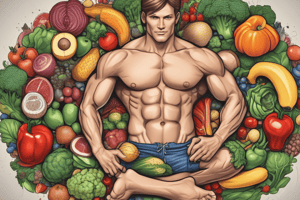Podcast
Questions and Answers
What is nutrition?
What is nutrition?
The process by which your body takes in and uses food
What are nutrients?
What are nutrients?
Substances in food that your body needs to grow, to repair itself, and to supply you with energy
What are carbohydrates broken down into to provide energy?
What are carbohydrates broken down into to provide energy?
Glucose
What are simple carbohydrates also known as?
What are simple carbohydrates also known as?
Which of the following are examples of complex carbohydrates?
Which of the following are examples of complex carbohydrates?
What is fiber?
What is fiber?
What are fats?
What are fats?
Describe saturated fats.
Describe saturated fats.
What are proteins?
What are proteins?
What are complete proteins?
What are complete proteins?
Describe water soluble vitamins.
Describe water soluble vitamins.
What are minerals?
What are minerals?
What are calories?
What are calories?
What is a supplement?
What is a supplement?
Where does digestion begin?
Where does digestion begin?
What is the esophagus?
What is the esophagus?
What is the stomach?
What is the stomach?
What is the small intestine?
What is the small intestine?
What is the function of the large intestine?
What is the function of the large intestine?
Describe the functions of the liver.
Describe the functions of the liver.
Flashcards
Nutrition
Nutrition
The process by which the body takes in and uses food for growth and energy.
Nutrients
Nutrients
Substances in food needed for growth, repair, and energy.
Carbohydrates
Carbohydrates
Nutrients broken down into glucose to provide energy.
Simple Carbohydrates
Simple Carbohydrates
Signup and view all the flashcards
Complex Carbohydrates
Complex Carbohydrates
Signup and view all the flashcards
Fiber
Fiber
Signup and view all the flashcards
Fats
Fats
Signup and view all the flashcards
Saturated Fats
Saturated Fats
Signup and view all the flashcards
Unsaturated Fats
Unsaturated Fats
Signup and view all the flashcards
Proteins
Proteins
Signup and view all the flashcards
Complete Proteins
Complete Proteins
Signup and view all the flashcards
Incomplete Proteins
Incomplete Proteins
Signup and view all the flashcards
Vitamins
Vitamins
Signup and view all the flashcards
Water Soluble Vitamins
Water Soluble Vitamins
Signup and view all the flashcards
Minerals
Minerals
Signup and view all the flashcards
Calories
Calories
Signup and view all the flashcards
Malnutrition
Malnutrition
Signup and view all the flashcards
Supplement
Supplement
Signup and view all the flashcards
Digestion
Digestion
Signup and view all the flashcards
Absorption
Absorption
Signup and view all the flashcards
Mouth
Mouth
Signup and view all the flashcards
Esophagus
Esophagus
Signup and view all the flashcards
Stomach
Stomach
Signup and view all the flashcards
Small Intestine
Small Intestine
Signup and view all the flashcards
Large Intestine
Large Intestine
Signup and view all the flashcards
Liver Functions
Liver Functions
Signup and view all the flashcards
Study Notes
- Nutrition is the process where the body intakes and utilizes food.
- Nutrients are substances in food necessary for growth, repair, and energy.
Carbohydrates
- Carbohydrates break down into glucose, providing energy.
- Simple carbohydrates (sugars) such as glucose and glycogen, are easily broken down and used for energy.
- Complex carbohydrates are starches found in grains, potatoes, and vegetables.
- Fiber is a complex carbohydrate that the body cannot digest.
Fats
- Fats are nutrients that support growth, provide energy, and maintain healthy skin.
- Saturated fats, solid at room temperature (e.g., in meats and whole milk products), raise blood cholesterol and heart disease risk.
- Unsaturated fats are liquid at room temperature and found in vegetable oils, nuts, and seeds.
Proteins
- Proteins are nutrients used to build and maintain cells and tissues.
- Complete proteins contain all essential amino acids and exist in soy and animal foods.
- Incomplete proteins lack one or more essential amino acids and are found in plant sources like nuts and legumes.
Vitamins and Minerals
- Vitamins are compounds that regulate bodily processes.
- Water-soluble vitamins dissolve in water and cannot be stored.
- Minerals are elements found in food and used by the body.
Measuring Energy
- Calories measure the amount of energy in foods.
- Malnutrition means a lack of proper nutrition.
- A supplement is something added to compensate for deficiencies.
Digestion and Absorption
- Digestion is the breakdown of food into simpler, absorbable forms.
- Absorption is the process of nutrient molecules passing into the blood through the digestive system's wall.
Digestive System
- Digestion starts in the mouth.
- The esophagus is a muscular tube connecting the mouth to the stomach.
- The stomach is an elastic sac that stores food, mechanically breaks it down, and starts chemical digestion of proteins and fats.
- The small intestine is where most chemical digestion and absorption occur.
- The large intestine absorbs water from food, and eliminates remaining material.
- The liver metabolizes fats, proteins, and carbohydrates.
Studying That Suits You
Use AI to generate personalized quizzes and flashcards to suit your learning preferences.
Description
Explore the essentials of nutrition, including the roles of carbohydrates, fats, and proteins in the body. Learn about simple and complex carbs, saturated and unsaturated fats, and complete and incomplete proteins. Understand how these nutrients fuel growth, energy, and overall health.




